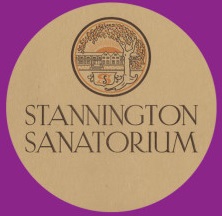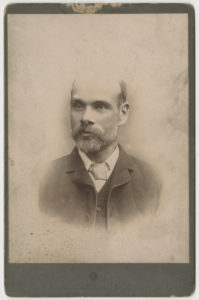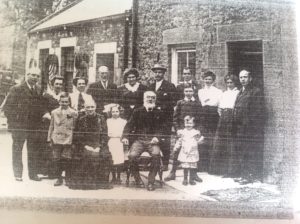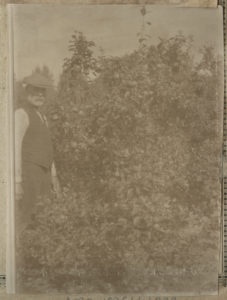
57 YEARS ON THE RAILWAY
RETIRAL OF MR GEORGE YOUNG AND PRESENTATION BY FELLOW WORKMEN
After fifty-seven years spent in the service of the North British Railway Company, Mr George Young, 8 Infirmary Square, a well-known figure at the Loco. Sheds at Berwick, retired at the beginning of the month, and on Thursday evening, in the Oddleffows’ Hall, a company of some forty fellow workmen under the presidency of Mr Joe Gray assembled to make a parting gift in token of the respect and esteem in which Mr Young was held.
Mr Gray briefly explained the object of the gathering, saying they were there to do a little honour to the oldest servant of the Railway Coy. at Berwick station, a man who they all held in the highest respect and esteem. Personal, said Mr Gray, I have always been closely associated with Mr Young. He was my driver at one time, and the friendship we formed on the footplate was not one to be readily broken.
A letter read from Mr J. P. Grassick, the Loco Running Superintendent of the L. and N.E.R. Coy. at Cowlairs, Glasgow, showed how much the long and honourable service of Mr Young was appreciated. “I cannot allow the occasion of your retiral from active service to pass unnoticed,” wrote Mr Grasswick. “Your work has been appreciated, and you enter upon your period of rest after a strenuous career with the best wishes of your employers. Personally, I have to thank you for services well rendered, and I hope you will belong spared to enjoy the remainder of your days in peace and comfort, freed from stress and turmoil of modern railway life.” The reading of the letter was received with applause.
Mr William Ewing, the foreman at Loco. Department, Berwick, then made on behalf of the employees at the sheds the presentation of a handsome silver lever watch, albert and medallion to Mr Young, along with a small sum of money remaining in the presentation fund. In a speech where the good qualities of the recipient were eulogised, Mr Ewing told of the ready way the employees had subscribed to give some little token to Mr Young as a memento of the many years he had been amongst them. He hoped Mr Young would accept the gift in the spirit in which it was made, and there was no need to assure him that he had left the Company’s service with the good wishes of all who had esteemed and appreciated his companionship and service in the past. (Applause).
Mr Young replied in a speech full of happy reminiscences of his past life on the railway, some of which we reprinted below, and he also told of one or two instances which were not of such a pleasing nature, when accidents had nearly brought about his end and the end of others. I started life as a boy under Mr Cargill in 1866, said Mr Young, and well I remember asking him for a start. I was just a little fellow then – fifteen years of age – and it was like looking up toa giant, for Mr Cargill was not a small man by any means. However, I was fortunate, for he started me at the handsome salary of 10d per day – ( laughter) – which was 2d a day more than was usually given to boys starting. Their wage worked out at ¾ per hour or 4s per week. Well, I was fortunate because I got 5s per week, but I wonder what some of you young chaps would say if you were asked to work for that now-a-days. (Applause). Mr Young also mentioned that there were only other two men alive today who had started life with him at Berwick Station. One was Mr Thos. Aird, coal merchant, who was then a fitter, and the other was Mr David Lawson, a native of Berwick, who had risen to be stationmaster at Shettleston, Glasgow, and who was now retired. During the time he had been on the railway he had worked under five different general managers, five loco. Superintendents, and fourteen loco. Foremen. He also mentioned that the father of Mr Ewing, their present foreman, had worked on the same footplate with him. Mr Young concluded a very interesting speech by thanking his fellow workmen for the honour they had done him.
A FEW REMINISCENCES
A DASH FOR SAFETY
A thrilling experience I have had, said Mr Young, was when I was running the 10 o’clock express between Edinburgh and Glasgow. Just at Winechburgh tunnel a goods train broke an axel and the damaged axel flew in front of my train. There was no time to draw up, and the only safety lay in putting on speed in the open of shifting the obstruction. We put on full steam. There was no Westenhouse brakes to apply and stop in time then, and when we hit the wreckage, we happily shifted it from the line. I was handsomely rewarded by the passengers, who subscribed for myself and the fireman the sum of £2 15s – quite a lot in those days.
PULLED A MAN OUT OF WAY OF EXPRESS
Another thing I remember, said Mr Young, happened shortly after that at Berwick station near the turntable. A St, Margaret’s driver named George Fortune – he is dead now, poor fellow – got right in the way of the express which was coming along. I saw his danger and clutching him succeeded in pulling him off the line. He did not escape injury, for he got a glancing blow from the buffer of the engine, which broke seven of his ribs, but he soon recovered and lived to a good age. Had I not reached him he would certainly have been knocked down and cut to pieces.
A PERSONAL ACCIDENT
I was nearly killed many years ago, said Mr Young, but it must not have been to be. I was starting a pumping engine which was used to be at the Sheds when my coat got into the belt. I did not pull it clear quick enough and I was carried round the shafting until I was stripped of clothing, and then I was flung senseless against the wall. Had I been thrown the other way I would have assuredly been killed outright, for I would have fallen into the well. As it was, I was very seriously injured about the head, legs and arms, and to this day I carry the marks on my legs. All the inspectors who examined the machinery in motion where I was caught could not credit that I could be carried round the shaft as I was and escaped alive.
BERWICK PETTY SESSIONS
MONDAY
Before C. L. Fraser and Chas. Forsyth, Esqs
A MORALISING TRAMP
John Kelly, vagrant, no fixed abode, was charged with being drunk and disorderly in Marygate at 9.5 p.m. on the 15th June. He pleaded guilty.
P. C Jefferson said the man was drunk, getting in front of motor cars and behaving in a foolish and disorderly manner.
Kelly was asked if he would promise to leave the town if he was discharged and he said, “I can promise nothing. I might just get drunk again and get into mischief. I do not think a day or two at Newcastle would do me any harm. It is the only way for you gentlemen to protect yourselves. I don’t believe in making promises if there is a possibility of breaking them. A man who habitually takes drink should not make promises.
Dr Fraser – Then there is no other option than to send you to prison for seven days.
Mr Forsyth – With hard labour.
Prisoner – With all due deference to you, sir. I don’t think they can give me hard labour. I am 62 years of age.
Dr Fraser – I don’t think he is sober yet.
Prisoner – Oh yes, but I will be better at Newcastle. It is twenty-one years since I was in Berwick last, and I hope it will be as long again before I am in it.
Dr Fraser – I hope so, too.
With a “Thank you, gentlemen,” prisoner went below to the cells prior to his trip to Newcastle.
SPORT
FOOTBALL
INFIRMARY CUP
Owing to the majority of the Spittal Hearts’ team being unable to be present at the Pierrots’ stand on Friday night the presentation of medals has been postponed.
It is hoped to send out circulars to all teams within a 25 miles’ radius of Berwick, and if a satisfactory entry is obtained to play one match per week throughout this season for the Cup. The rules, which are comparatively few, bar players who have played for Berwick Rangers or Coldstream during the season. The competition is strictly amateur, and teams will be paid minimum travelling fares for 12 players. Layers must play for one team only in the competition.
CYCLING
TEN MILE CYCLING RACE ON NORTH ROAD
The Tweedside Cycling Club held their 10 miles road trial over the North Road on Thursday evening last under handicap conditions, when a large assembly lined the footpath out by meadow House to see the finish of the race. The feature of the handicap was the wonderful riding of J. H. Kirkup, a Millfield lad aged nineteen, who had the fastest time of the evening, 25 mins, 44 secs. actual. The prize winners and times were as follows: – 1, P. Gleig, 29 mins. 46 secs., less 6 mins., 23 mins. 46 secs.; 2, J. Tennant, 29 mins, 16 secs., less 5 mins., 24 mins. 16 secs.; 3, J. H. Kirkup, 25 min. 44 secs, less 1 min., 24 mins. 44 secs. E. Young, who was scratch, covered the distance in 25 mins. 59 secs., or 15 secs, longer than Kirkup. Other young riders’ times were :- T. Clazie, 28 mins. 30 secs., less 4 mins., 24 mins, 30 secs.; L. B. Dickinson, 31 mins. 17 secs., less 5 mins., 26 mins. 17 secs.; and A. Aird, 31 mins. 45 secs., less 4 mins., 27 mins, 45 secs. Kirkup, it will be remembered, was the rider who won the double event in the half mile and mile last years at the Tweedside Cycling Club Sports. He is riding wonderfully well this year, and those in the know look upon him as a coming champion.
AUSTRALIA’S CALL
BAMBURGH MAN’S SUCCESS IN FARMING
“This country appears to be over-crowded, and to find so many young men unemployed and hanging about the city streets is a sad and depressing reflection on present-day life when one knows that in Australia there are thousands of acres ready for settlers to enjoy a new and glorious life. The kind of men wanted are only those who are determined to work hard, and to make a home for themselves in that fertile country. Fired by that ambition, emigrants are almost bound to succeed.”
These sentiments were voiced to a “Newcastle Daily Journal” representative by Mr George Waddell, a Western Australian farmer, who, with his wife, is at present on a visit to Tyneside, renewing old friendships. Mr Waddell, who was born in the parish of Bamburgh, fifty-eight years ago, at one time followed the plough, and later was a servant on the railway company in Newcastle as a rolleyman.
SUCCESS IN TWELVE YEARS
It should be noted that Mr Waddell was forty-six years of age when he decided to seek his fortune in Western Australia, and within the space of twelve years, by reason or hard, unremitting labour, he has built up one of the most successful farming businesses in that fertile area, 200 miles from Perth, Quarendin Vale, Belka. What was once a stretch of 1,000 acres of rough forest land, obtained from the Australian Government, has now been converted into a wheat-growing farm, yielding satisfactory returns.
Having visited the recent Royal Show, Mr Waddell said the bulk of the farm machinery there displayed was not applicable to western Australia wheat farming conditions. Out there, farm appliances are manufactured on a larger scale, teams of five to six horses being employed as a rule on one implement. The harvesting machines, for instance, are built on altogether different lines, as only the heads of the grain are cut and harvested, the “straw” being left standing in the field to be used as fodder or burned.
HORSES PREFFERED
The farm tractors are not yet much in vogue on the large fields of this Western Australian State. Most farmers, chiefly on grounds of economy, pin their faith to horsepower. Personally, Mr Waddell prefers the Clydesdale horses, of which he owns 25, because of their power and activity.
While the disposal of the wheat is now free and independent, Australian farmers in Mr Waddell’s area have formed a voluntary co-operative wheat pool by which about 80 per cent, of the wheat produced is dealt with.
With regard to the labour question, Mr Waddell stated that no women are employed in field work. With so many labour-saving appliances now in use six men can work quite well a wheat farm of about 1,000 acres. One experienced man is required to handle a team of five or six horses engaged in field operations. Seldom does a farm hand require to work more than eight hours a day.















